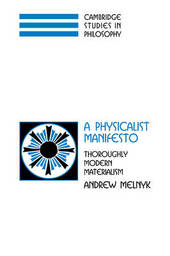
|
A Physicalist Manifesto: Thoroughly Modern Materialism
Paperback / softback
Main Details
| Title |
A Physicalist Manifesto: Thoroughly Modern Materialism
|
| Authors and Contributors |
By (author) Andrew Melnyk
|
| Series | Cambridge Studies in Philosophy |
|---|
| Physical Properties |
| Format:Paperback / softback | | Pages:344 | | Dimensions(mm): Height 229,Width 153 |
|
| Category/Genre | Analytical philosophy and Logical Positivism
Philosophy - metaphysics and ontology |
|---|
| ISBN/Barcode |
9780521038942
|
| Classifications | Dewey:146.3 |
|---|
| Audience | | Professional & Vocational | |
|---|
| Illustrations |
Worked examples or Exercises
|
|
Publishing Details |
| Publisher |
Cambridge University Press
|
| Imprint |
Cambridge University Press
|
| Publication Date |
4 August 2007 |
| Publication Country |
United Kingdom
|
Description
A Physicalist Manifesto is a full treatment of the comprehensive physicalist view that, in some important sense, everything is physical. Andrew Melnyk argues that the view is best formulated by appeal to a carefully worked-out notion of realization, rather than supervenience; that, so formulated, physicalism must be importantly reductionist; that it need not repudiate causal and explanatory claims framed in non-physical language; and that it has the a posteriori epistemic status of a broad-scope scientific hypothesis. Two concluding chapters argue in detail that contemporary science provides no significant empirical evidence against physicalism and some considerable evidence for it. Written in a brisk, candid and exceptionally clear style, this 2003 book should appeal to professionals and students in philosophy of mind, metaphysics and philosophy of science.
Reviews'This is unquestionably the best elucidation and defense of physicalism as a general world view ever produced by a philosopher.' Michael Tye, The University of Texas, Austin 'This excellent book by Andrew Melnyk is both timely and significant. It is timely because now is a good time to take stock of the physicalist debate over the past half century, and Melnyk does that with impressive systemacity and comprehensiveness. Moreover, the book is an important ... contribution to that debate. Melnyk offers us a form of physicalism, 'realization physicalism', that is robustly reductionist and yet non-eliminative - that is, reductive physicalism that respects the integrity of the causal/explanatory claims of the special sciences. Melnyk's physicalism is a far cry from the pale, insubstantial forms of nonreductive physicalism that have been dominant. One particularly valuable aspect of the book is its extensive coverage of the question of empirical support for physicalism. Here, Melnyk goes far beyond those physicalists who take the attitude 'I say that mental states are physical states - refute me if you can!" Jaegwon Kim, Brown University
|